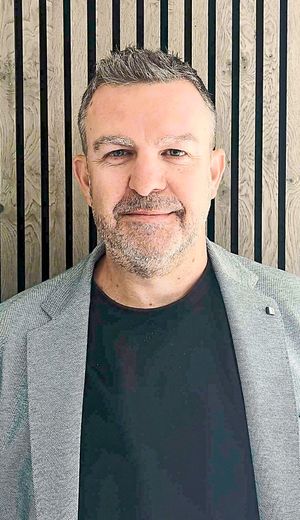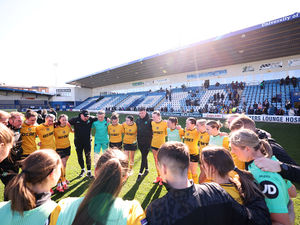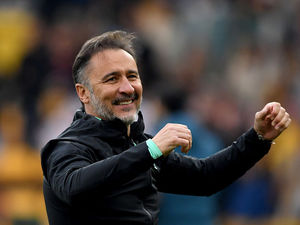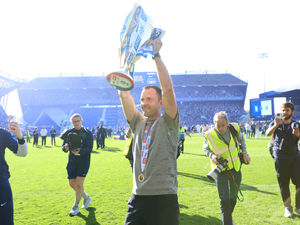Kris Sleeuwenhoek: The story of the former Wolves goalscoring prodigy
It could be said that Kris Sleeuwenhoek had a foot in both camps in last night’s Euro 2024 semi-final.
Watch more of our videos on ShotsTV.com
and on Freeview 262 or Freely 565
Brought up in Wednesfield, and an England fan, his grandfather was Dutch. He had his own flirtation with England honours in a football career which sadly was over before it had really begun. Paul Berry found out more.
There was a time when the name Kris Sleeuwenhoek meant pretty much one thing. Goals. And plenty of them.
The prolific striker from Wednesfield, with an electric turn of pace and clinical finish, certainly knew where the back of the net was.
A plethora of goals at youth level saw him reach the fringes of the England youth set-up andonly miss out on a place at the prestigious FA School of Excellence at Lilleshall having been pipped by Andy Cole. Wonder what became of him.
Sleeuwenhoek, whose father John made 260 appearances in the Aston Villa defence in the 1960s, was hot property, and that led to the other reason why his name remains entrenched in the memory banks of a particular generation of the Molineux faithful.
At the start of the 1988/89 season, the then 16-year-old frontman made the move to Derby County but, having been on schoolboy terms at Wolves at the time, the Rams were accused of making an illegal approach.
‘Poachers’ screamed the headline on the back page of one of the tabloids. ‘Derby’s tap rap’ boomed another.
At a Football League hearing, Derby were found guilty and instructed to pay Wolves £40,000 for Sleeuwenhoek, along with other potential add-ons, as well as a further £25,000 following the similar capture of Jason Kavanagh from Birmingham City.
Derby, at the time, were in the top division, and Sleeuwenhoek was regarded as an outstanding prospect.
But through no fault of his own, his career trajectory was destined not to follow the path to the goalscoring fame and fortune which his abundant potential merited.
In a truly awful five month period before and during his second season at Derby, Sleeuwenhoek’s father passed away after suffering a heart attack at the age of just 45, and he suffered a severe knee injury from which he never completely recovered.
And that came just 24 hours after hearing he had been called into the England Under-18 squad for a European Championship qualifier against Czechoslovakia. Sliding doors.
By the age of 21, he had effectively retired from professional football, never again to return to the same levels which had propelled him to the brink of a career in the game.
For the last three decades, despite still living in the local area, now settled in Penkridge, Sleeuwenhoek has kept a fairly low profile when it comes to football.
He knuckled down elsewhere, building a very successful new career as a financial advisor, recently setting up his own business as one final exciting and fulfilling working challenge which he hopes will also lead back into sport.
Alongside that new chapter has also arrived a more reflective dimension.
His father would have turned 80 back in February, prompting Sleeuwenhoek to reach for the old scrapbooks to look back on his career. Perfectly understandably, he is keen to keep those memories alive.
Around the same time, he was invited by Wolves club historian Peter Crump to one of his excellent talks at Wolves Museum, a look back at the club from 1986-90 during which he featured.
It was Sleeuwenhoek’s first time back at Molineux for many years, and he enjoyed it, but, even then, gave plenty of thought to whether to do this follow-up interview.
That’s because there is an extent to which Sleeuwenhoek felt he didn’t achieve anything having not made it at senior level.

And yet, in essence he achieved so much, and has done likewise since hanging up his boots, along with that much-deserved ambition to be proud of his family ties.
“A lot of my work since finishing football has been over Birmingham way, and, with my surname and Dad’s career, I am often asked if I am any relation and found out more about what a star he was locally and how much the Villa fans thought of him,” he explains.
“To an extent, I have always been known as ‘the son of’, and that’s absolutely fine.
“But as time goes on, and with that landmark birthday for my Dad, it kind of feels like his name is slowly disappearing and only people of a certain age would remember him.
“And I suppose, in my own case, I didn’t actually make it and went through a turbulent time, and I wonder if that was enough to leave some sort of footprint?
“Have I got a decent story to tell? I’m not sure really, I suppose I was a football player for a time, playing with and against some legends of the game, and it was really nice to be invited back to Wolves by Peter for the talk.
“It’s been nice to get that little bit of validation but I’m keen just to keep that recognition going for my Dad before it’s gone forever, apart from just being remembered in the history books.”
Sleeuwenhoek is a name that wasn’t particularly prevalent in Wolverhampton as it hailed from a Dutch paratrooper, who met John’s mother, whilst being stationed in Tettenhall during the Second World War.
Growing up a Wolves fan and watching the team from the terraces, Sleeuwenhoek senior was snapped up by Villa boss Joe Mercer as soon as he left school, adding two England Under-23 caps to his CV along with becoming a regular at Villa for six years, later being signed by Stan Cullis at Birmingham.
As his own career came to a close, he took more of an interest in Kris’s prospects, becoming joint manager, alongside Tony Painter, of the ultra-successful Dovedale Dynamos junior team which was to deliver so much success not to mention so many players who would progress to professional clubs.
Among those players was his own son, along with others who also progressed to Wolves such as Neville Fennell, Stuart Leeding, Stuart Evans, Loy Stobart and David Butler, as well as Mark Ashton the goalkeeper, now CEO at Ipswich in the Premier League, and Steve Hayward, notably of Fulham, amongst others.





